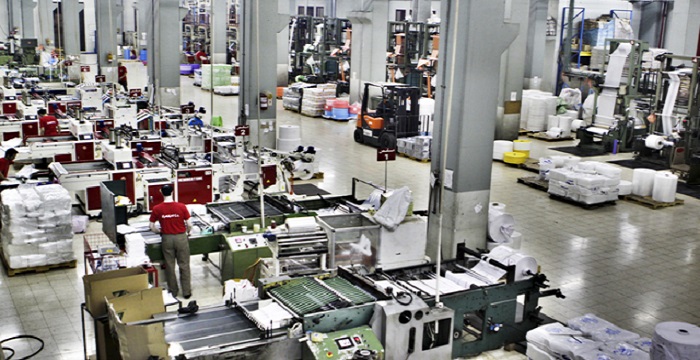The Palestinian Industrial Sector: a Reality that Falls Short of Ambition

Hasnaa Al Rantisy – Palestine Economy Portal
Translated by Tamara Barakat
The Palestinian industrial sector witnessed many difficult periods that hindered its growth. Currently, imports from Israel remain steady, amounting to around $4.5 billion, even during periods of boycotting Israeli products and goods.
Labor Absorptive Capacity
Nasser Ityani, economic expert and general manager of the Food Industries Union, said that high hopes are placed on the industrial sector, whose labor absorptive capacity is 12% (2013 statistics), especially in light of the difficult conditions the Palestinian economy suffers from due to the Israeli policies and measures aimed at strengthening its dependence on the Israeli economy.
According to statistics published in 2014, the Palestinian industrial sector employs around 86,000 workers in 17,000 institutions.
Ityani explained that according to most studies conducted on the industrial sector, the main problem is that the sector operates with only 50% of its production capacity, and if its production capacity increases to 70%, this will create 40,000 new job opportunities.
Value Added by Economic Activity
The table below illustrates the value added of the industrial sector for the years 1999-2014. The value added of the industrial sector is calculated by dividing the sum of the value added of the mining, quarrying, and manufacturing activities by the GDP for each year.
According to the table, the value added of the industrial sector ranged between 10 -13%.
The following chart illustrates the contribution of the industrial sector to the GDP.
Ityani said international experiences in the field of economic and social development clearly demonstrate that the industrial sector played an important role in those experiences. This underlines the importance of devising Palestinian industrial policies that serve the development of the Palestinian industrial sector, which in turn will increase this sector’s contribution to the GDP and achieve more economic development in Palestine.
Obstacles
The industrial sector suffered from structural and substantial problems that hindered its growth, due to the Israeli occupation that ensured the dependence of the Palestinian economy on the Israeli economy, rendering it fragile and easily affected by any changes in the Israeli economy.
Ityani confirmed this, saying that around 85% of raw and primary materials used in the production of Palestinian goods is imported from or through Israel.
“This, in itself, is a serious indicator to the extent the Palestinian economy is affected by Israeli policies,” he added.
Increase in Trade Deficit
Palestinian exports to international markets during 2014 amounted to around $943 million, increasing by 4.3% in comparison with 2013.
However, Palestinian imports during 2014 amounted to around $5.7 billion, increasing by 9.5% in comparison with 2013.
Consequently, the trade deficit increased.
Workforce
The industrial sector employs 11.9% of the overall Palestinian workforce, 12.6% of whom are male, and 8.5% are female. Moreover, the industrial sector employs 15.3% of the workforce in the West Bank, and 5.4% in the Gaza Strip.
Ityani emphasized the importance of formulating policies and strategies that aim to improve the Palestinian industrial sector’s performance and reduce its dependence on the Israeli economy.
He also added that the sector’s competitiveness should be improved and the national product should be supported within local, regional, and international markets. This requires setting strategies and action plans and creating programs to foster loyalty among Palestinian citizens toward locally produced goods.
Facts and Figures
- Palestinian imports from Israel amount to $4.5 billion, $2.5 billion of which are energy and oil imports.
- Official statistics demonstrate that Palestine primarily depends in its imports on the Israeli market. 70% of Palestinian imports are from Israel, which ensures the continual of the control of one trading partner on Palestine’s foreign trade.
- Economic experts confirmed that most of the goods Palestine imports from Israel are produced abroad and re-exported. The custom duty and taxes imposed on these products are transferred to the Israeli Treasury.
- 85% of primary and raw materials used in the production of Palestinian goods is imported from or through Israel.
- According to the Ministry of National Economy, the market share of local products is 20%.


